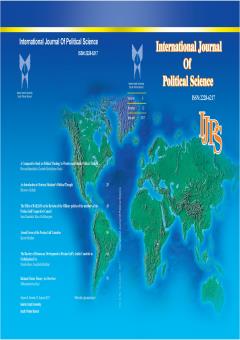Examining the Opportunities and Challenges of Shi'a Culture and Religion in the Political Development Process of Iraq After Saddam Hussein
Subject Areas :
Toktam Shahrestani
1
,
Ali Shirkhani
2
![]() ,
Mashallah Heydar Pour
3
,
Mashallah Heydar Pour
3
1 - Department of Political Science, Qom Branch, Islamic Azad University, Qom, Iran
2 - Department of Political Science, Qom Branch, Islamic Azad University, Qom, Iran
3 -
Keywords: Opportunity, Challenge, Shia Culture, Shia Religion, Political Development,
Abstract :
The present research aims to examine the opportunities and challenges of Shia's culture and religion in the political development process in Iraq after Saddam. The research method is de-scriptive-analytical, and the results indicate that post-Saddam Iraq provided a new opportunity for Shia to participate in power and incorporate their cultural and religious components into governance and forward-looking politics. Shia religion, due to its distinct principles of justice and imamate, sets it apart from other Islamic sects, principles that result in rationality, dy-namic jurisprudence, and freedom, aligning with political development. The approaches of Shia authorities in recent years indicate the existence of rationality as a key element and indi-cator of political development. The attention of the people and obedience to the institution of authority in various fatwas and numerous crises witnessed by Iraq are evidence of political maturity and the growth of customary reasoning among the Shia community in Iraq. Howev-er, Shia in Iraq, due to years of staying away from power, lack of political governance experi-ence, different interpretations of Shia jurisprudence regarding intervention and participation in politics, and realities of society and the international system imposed on Shia culture, have not been entirely in harmony with the Western concept of political development with Shia religious components in this post-Saddam era.
Holy Quran
Ahmadi, Farajollah; Ghazvini Hayeri, Yaser (2010). The process of drafting the Iraqi Constitution. Politics, Volume 40(14).
Al-Mahmoud, Ali Tahir (2018). The emer-gence of Shia government: The ex-perience of Shia governance in post-Saddam Iraq. Isfahan: Arma.
Amini, Nematollah (2020). Examination of the concept of freedom in Shia ju-risprudence. New Horizons in Politi-cal Jurisprudence, No. 8.
Aminzadeh, Mohsen (1997). Political devel-opment. Political and Economic In-formation, No. 117-118.
Ashrafi, Jamal (undated). Typology of Shia intellectual-religious currents in the new Iraq, International Institute of Mustafa.
Feyrahi, Davood (1998). Foundations of freedom and party in Shia jurispru-dence. Political Science, No. 3.
Ghorbani, Arsalan; Bashiri, Saeed; Alizadeh, Javad (2015). The role of the politi-cal authority of Ayatollah Sistani in the process of state-building in post-Saddam Iraq. International Relations Studies, 8(30).
Haji Yousefi, Amir Mohammad; Solta-ninejad, Ahmad (2008). Political system in the new Iraq, Office of Po-litical and International Studies.
Jalaeipour, Hamidreza (2013). Sociology of Iran: Distorted modern society. Nashr-e Elm.
Kalberg, Stefan (2010). Types of rationality from the perspective of Max Weber. Foundations for the analysis of ra-tional processes. Translated by Me-hdi Dastgerdi. Ma'aref Magazine, No. 80.
Kazemi Shamloo, Mehdi (2017). Examining the fourfold sources of jurisprudence from the Shia and Sunni perspec-tives (reason, consensus, tradition, Quran). Sokhan Jamee, 6(12).
Khorramabad; Mohammad Baqer, Jamshidi-an, Hadi; Aghayi, Seyed Hassan; Akhtari, Mohammad Hassan; Ra-shid, Abdul Reza (2022). Network-ing of Shia Muslims worldwide: Op-portunities and challenges ahead. National Security Journal, No. 45.
Masjed Jamei, Mohammad (2018). Iran and the geopolitics of the region: Find-ings and unseen. Information Publi-cations.
Mir Ahmadi, Mansour (1998). The concept of freedom in Shia political jurispru-dence. Political Science, 1(1).
Moghniyeh, Mohammad Javad (1998). Al-Mizan Fi Al-Shi'a. Lebanon: Dar Al-Tayyar Al-Jadeed.
Mohajeri, Masih (2012). Ayatollah Sistani and the new Iraq. Publications of the Islamic Republic newspaper.
Mohegh, Seyed Adnan (2010). The role and function of the transcendent institu-tion of Shia authority in contempo-rary Iraq. Middle East Studies, No. 62.
Nahj al-Balaghah.
Qadrdan Qaramolki, Mohammad Hassan (2003). Freedom in jurisprudence and its limits. Qom: Boostan Ketab.
Rahbar, Abbasali (2014). The interaction of culture construction with political development in Shia political cul-ture. Strategic Policy Research, 3(39).
Rashidi Zadeh, Behnam; Mohammadi, Ali (2018). Political culture and its im-pact on the failure of the democrati-zation process in the Middle East with an emphasis on the Arab world. Political Sociology of the Islamic World.
Sadeghi Fadaki, Seyed Jafar (2022). What Shias Say. Tehran: Mirashe Sharq.
Sardarnia, Khalilullah; Zare Mehr Abadi, Mohammad (2015). Federalism and political culture in Iraq. Foreign Re-lations, No. 25.
Sari'al-Qalam, Mahmoud (1992). The princi-ples of stable political development. Political-Economic Information Journal, No. 55-56.
Shafiee, Mahmoud (2002). Reason and ra-tionality in Shia political thought. Political Science, No. 17.
Shirkhani, Ali (2007). Freedom from the perspective of Shia Islam. Tehran: Center for Islamic Revolution Doc-uments.
Shiroodi, Morteza; Azizkhani, Ahmad (2013). The impact of Shia messian-ism on the political development of Shia societies in the era of occulta-tion is based on the three compo-nents of wisdom, love, and justice. Journal of Islamic Political Research, No. 3.
Valayi, Ali Mohammad; Farahmand Pour, Fahimeh (2010). The teachings of the Imams and the structural chang-es of the Shia religion. Journal of Iranian History, 1(4).
Yousefi, Mohammad Ali; Amini, Amrollah (2022). Evolutionary rationality and development. Economic Analysis of Iran's Development, No. 21.
Zargar, Alireza; Nafar, Zahra (2016). Explor-ing the impact of Shia political cul-ture on the formation of the roots of the Islamic Revolution and its victo-ry. Islamic Revolution Studies, No. 16.


